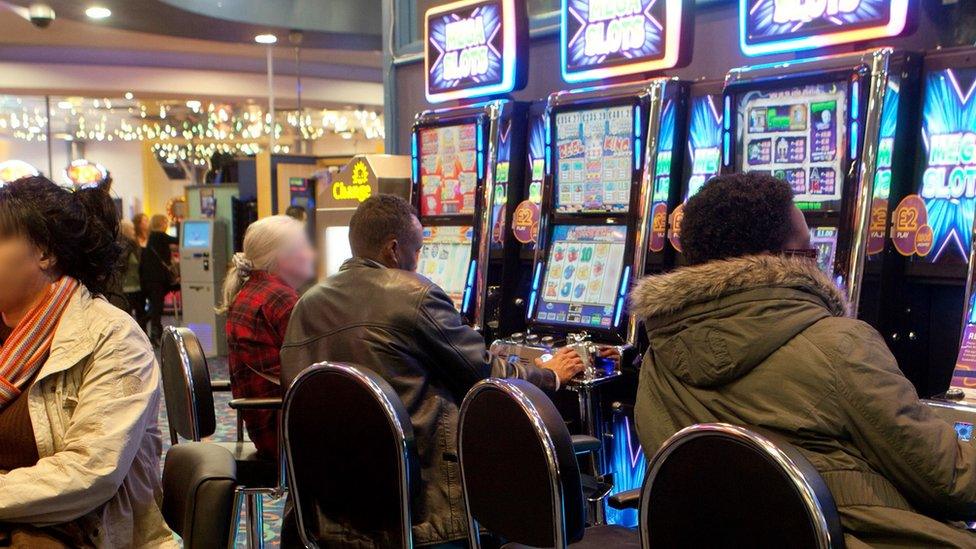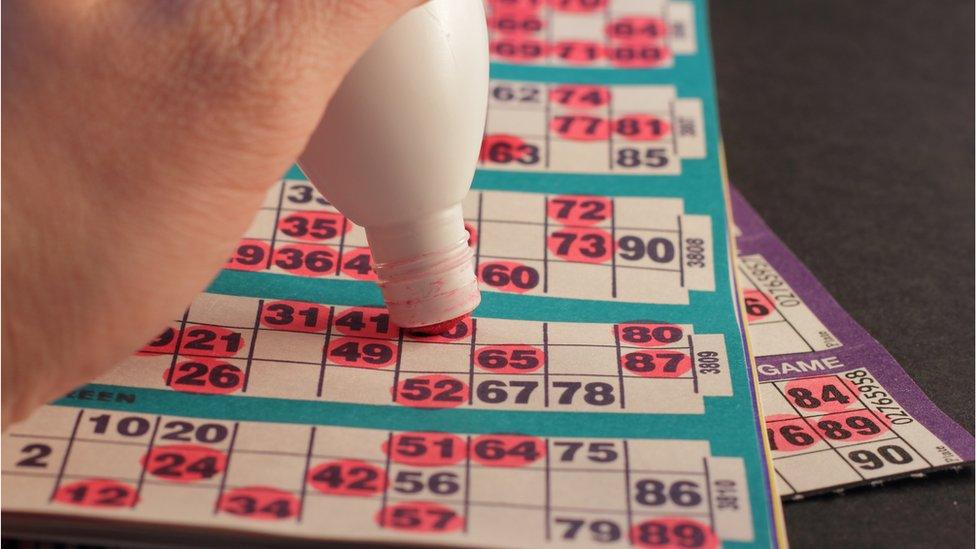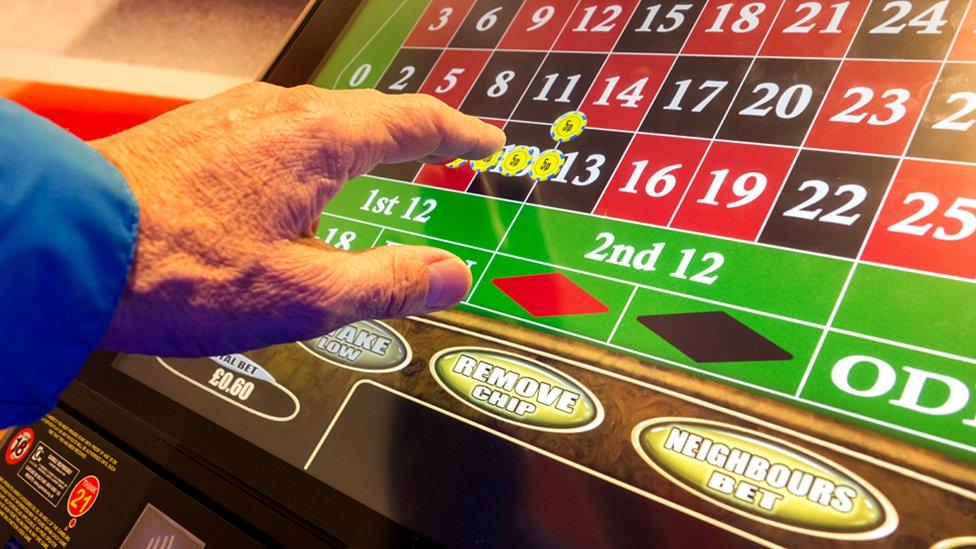The slot machines that changed bingo
- Published

The number of higher-stake slot machines found in bingo halls has tripled during the past five years. But what happens when some players lose life-changing amounts?
For most people, bingo halls still make them think of "legs 11" - a caller rattling off numbers as elderly players frantically scour their cards.
But walk into most major bingo halls today and first you will have to navigate the flashing lights and high-pitched bleeps of gaming machines - and, probably, plenty of them.
Slot machines are a fast growing source of revenue for bingo companies - £304m last year - in a world where the traditional or "main-stage" game is stagnating, at best.
In one hall in east London - with a licence to open until 02:30, seven days a week - there are 90 of these machines, nearly all packed in the entrance hall before you reach the bingo tables. There are more elsewhere in the venue.

Find out more
Watch video journalist Jim Reed's full film on the Victoria Derbyshire website.
The Victoria Derbyshire programme is broadcast on weekdays between 09:00 and 11:00 on BBC Two and the BBC News channel.

Twenty-two of them are higher-stake, "Vegas-Style" slot machines with a stool and two or three brightly coloured touchscreens each.
They take only bank notes and let players bet £2 a spin every two or three seconds.
One afternoon, a woman, keen to hold her seat, places a reserved sign on her machine as she briefly steps away.
For some, the machines have led to a serious problem.
Mary, not her real name, is in her 70s.
She was drawn in by a lucky early bet - winning the £500 jackpot. But her luck did not last.
"The first time I lost a lot of money, £300... I felt absolutely sick and thought, 'I'm never going to do this again,'" she told the BBC's Victoria Derbyshire programme.
"But I did. I would go through £1,000, £2,000 in an evening. I would walk outside without a penny to my name and go home and act completely normal."
Mary, and others we spoke to, said she had noticed the atmosphere in halls "change completely" during the past few years as more higher-stake - or B3 - slot machines had been introduced.
"You would see people absolutely desperate," she said.
"Women would cry. I've known people whose marriages have broken up. One woman I got to know very well lost her business through it. She would put a whole day's takings through these slot machines."
Mary said she had never seen staff intervene to warn people about gambling responsibility, or ask them to take a break from the machines.
"They would just tap you on the shoulder and ask you if wanted a drink or something to eat," she said.
She estimates that playing slot machines at bingo halls cost her £70,000, with another £150,000 later lost playing slots on bingo websites.

Gambling statistics
2.5% of people who regularly go to bingo halls have a serious gambling problem
The overall level of problem gambling in the UK population is estimated as between 0.5% and 0.9%
4.2% of people who play slot machines in bingo halls have a serious gambling problem
40.3% of people who play slot machines in bingo halls show at least one sign of risky gambling behaviour

Mary played with her husband's money without his knowledge, losing much of their joint savings. As her addiction became worse, she tried to take her own life.
"I really feel that my life has been a sham," she said.
"I am a liar, I am a thief, and that doesn't sit easily - that doesn't sit easily with anybody, I don't think."
In 2011, the government relaxed the rules around slot machines in licensed bingo establishments.
Companies used to be allowed a maximum of eight higher-stake B3 slot machines per licence.
Now, they are allowed an unlimited number, providing they do not exceed 20% of the total gaming machines on each physical site.
When the new law came in, the Gambling Commission, which regulates the sector, said it expected the number of B3 machines to rise by just 690 nationwide.
Since 2011, the number has risen by 6,226 to 10,014 in total.

Traditional bingo has been eclipsed by online sites in recent years
One former general manager, speaking anonymously, described the machines as "legalised mugging".
"It's actually horrible to watch how some people gamble and lose," he said.
"I remember one lady customer who would come in, and she was reasonably affluent.
"One day I walked in and found her playing the same game on four machines.
"She'd been there all day.
"When I checked the machine histories the next morning, I found that in total she had bet almost £12,000."
The bingo industry said the rise in higher stake machines had been driven by customer demand.
"[Bingo halls] have certainly taken advantage of that 20% facility. But at the end of the day if customers didn't want to use them, if there wasn't demand for them, then we wouldn't provide them and they wouldn't be there," said Miles Baron, the chief executive of the Bingo Association.
"It is not a massive cause of concern, because levels of problem gambling in bingo have remained stable."

Miles Baron, of the Bingo Association, believes the rise in machines meets customer demand
Anti-gambling campaigners say they would like to see greater protection for players, with more warning messages on machines and a ban on placing free cash machines next to slot machines in bingo halls.
The Bingo Association says the way the industry deals with problem gambling has "moved on considerably" in recent years, with staff now trained to recognise addictive behaviour and a new self-exclusion scheme in place.
The government has now launched a review of the law around gaming machines, including those in bingo halls, with full recommendations expected next year.
The Gambling Commission said it would be "inappropriate" for it to comment while the review is ongoing.
A spokesman for the Department for Culture, Media and Sport said the government's review would include B3 machines.
He added: "It is important that gambling regulations strike the right balance between allowing the industry to contribute to the economy and enable people to bet responsibly, whilst ensuring consumers and communities are protected."
- Published26 August 2015
